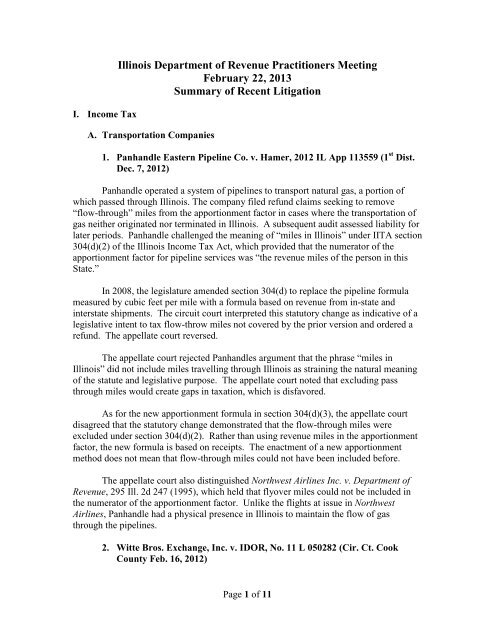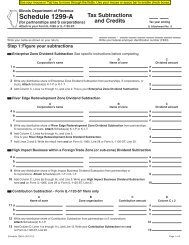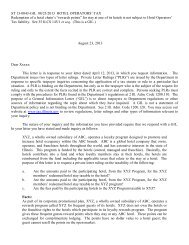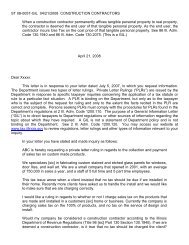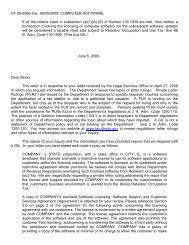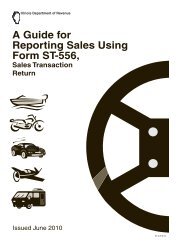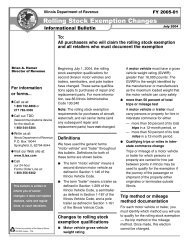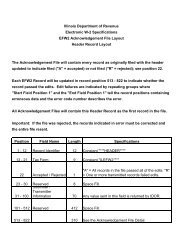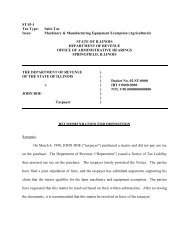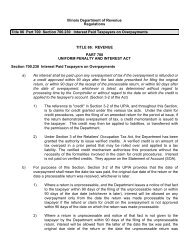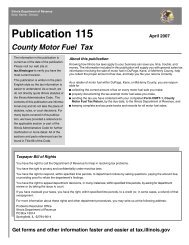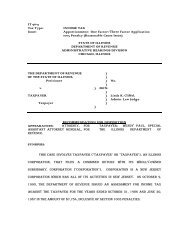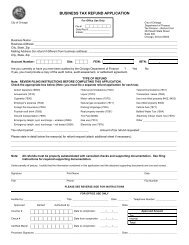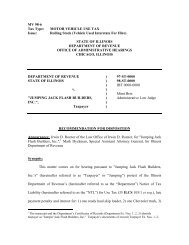Summary of Recent Litigation - Illinois Department of Revenue
Summary of Recent Litigation - Illinois Department of Revenue
Summary of Recent Litigation - Illinois Department of Revenue
Create successful ePaper yourself
Turn your PDF publications into a flip-book with our unique Google optimized e-Paper software.
I. Income Tax<br />
<strong>Illinois</strong> <strong>Department</strong> <strong>of</strong> <strong>Revenue</strong> Practitioners Meeting<br />
February 22, 2013<br />
<strong>Summary</strong> <strong>of</strong> <strong>Recent</strong> <strong>Litigation</strong><br />
A. Transportation Companies<br />
1. Panhandle Eastern Pipeline Co. v. Hamer, 2012 IL App 113559 (1 st Dist.<br />
Dec. 7, 2012)<br />
Panhandle operated a system <strong>of</strong> pipelines to transport natural gas, a portion <strong>of</strong><br />
which passed through <strong>Illinois</strong>. The company filed refund claims seeking to remove<br />
“flow-through” miles from the apportionment factor in cases where the transportation <strong>of</strong><br />
gas neither originated nor terminated in <strong>Illinois</strong>. A subsequent audit assessed liability for<br />
later periods. Panhandle challenged the meaning <strong>of</strong> “miles in <strong>Illinois</strong>” under IITA section<br />
304(d)(2) <strong>of</strong> the <strong>Illinois</strong> Income Tax Act, which provided that the numerator <strong>of</strong> the<br />
apportionment factor for pipeline services was “the revenue miles <strong>of</strong> the person in this<br />
State.”<br />
In 2008, the legislature amended section 304(d) to replace the pipeline formula<br />
measured by cubic feet per mile with a formula based on revenue from in-state and<br />
interstate shipments. The circuit court interpreted this statutory change as indicative <strong>of</strong> a<br />
legislative intent to tax flow-throw miles not covered by the prior version and ordered a<br />
refund. The appellate court reversed.<br />
The appellate court rejected Panhandles argument that the phrase “miles in<br />
<strong>Illinois</strong>” did not include miles travelling through <strong>Illinois</strong> as straining the natural meaning<br />
<strong>of</strong> the statute and legislative purpose. The appellate court noted that excluding pass<br />
through miles would create gaps in taxation, which is disfavored.<br />
As for the new apportionment formula in section 304(d)(3), the appellate court<br />
disagreed that the statutory change demonstrated that the flow-through miles were<br />
excluded under section 304(d)(2). Rather than using revenue miles in the apportionment<br />
factor, the new formula is based on receipts. The enactment <strong>of</strong> a new apportionment<br />
method does not mean that flow-through miles could not have been included before.<br />
The appellate court also distinguished Northwest Airlines Inc. v. <strong>Department</strong> <strong>of</strong><br />
<strong>Revenue</strong>, 295 Ill. 2d 247 (1995), which held that flyover miles could not be included in<br />
the numerator <strong>of</strong> the apportionment factor. Unlike the flights at issue in Northwest<br />
Airlines, Panhandle had a physical presence in <strong>Illinois</strong> to maintain the flow <strong>of</strong> gas<br />
through the pipelines.<br />
2. Witte Bros. Exchange, Inc. v. IDOR, No. 11 L 050282 (Cir. Ct. Cook<br />
County Feb. 16, 2012)<br />
Page 1 <strong>of</strong> 11
Witte Bros. is an interstate trucking company based in Missouri. In addition to<br />
making deliveries to and picking up goods from customers in <strong>Illinois</strong>, Witte Bros. also<br />
provides transportation services to customers located out <strong>of</strong> state that require it to operate<br />
its trucks on highways in <strong>Illinois</strong> without making any deliveries along the way.<br />
On its returns for tax years ending September 30, 2005, 2006 and 2007, Witte<br />
Bros. computed the numerator <strong>of</strong> the apportion factor by including revenue miles where<br />
its trucks picked up or delivered goods in <strong>Illinois</strong> and excluding revenue miles where its<br />
trucks passed through <strong>Illinois</strong> without making deliveries or pickups. The <strong>Department</strong><br />
conducted an audit and determined that the pass-through miles should be included in the<br />
numerator. Witte Bros. paid the assessment under protest and filed suit in circuit court.<br />
Witte Bros. alleged that it did not derive income from furnishing transportation<br />
services in <strong>Illinois</strong> within the meaning <strong>of</strong> IITA section 304(d)(1) when it transports goods<br />
from origins outside <strong>Illinois</strong> to destinations outside <strong>Illinois</strong>. Witte Bros. also contended<br />
that subjecting pass-through miles to tax in <strong>Illinois</strong> would impose an unconstitutional<br />
burden on interstate commerce. The circuit court found that the <strong>Department</strong> cannot tax<br />
pass-through miles under section 304(d)(1) and granted partial summary judgment in<br />
favor <strong>of</strong> Witte Bros. An appeal is pending.<br />
B. Amnesty Cases<br />
1. Metropolitan Life Insurance Co. & Unitary Subs. v. Hamer, 2012 IL App<br />
110400 (1 st Dist. March 5, 2012)<br />
From October 1 through November 17, 2003, the <strong>Department</strong> administered an<br />
amnesty program, whereby interest and penalties were abated for all liabilities accruing<br />
from June 30, 1983, until July 1, 2003, and satisfied during the amnesty period. Failure<br />
to participate in the amnesty program resulted in penalties and interest being doubled. At<br />
the time <strong>of</strong> the amnesty program, MetLife was undergoing a federal audit for 1997<br />
through 1999. The federal audit was not finalized until July 29, 2004.<br />
The <strong>Department</strong>’s emergency regulations required taxpayers to make a good faith<br />
estimate <strong>of</strong> any potential federal change, file an amended return and pay during the<br />
amnesty period. MetLife did not participate in the amnesty program; rather in August<br />
2004, it provided the federal adjustments to the auditor conducting an <strong>Illinois</strong> income tax<br />
audit. The auditor incorporated the final federal changes into her workpapers dated<br />
December 10, 2004. MetLife paid the additional tax due at the conclusion <strong>of</strong> the audit in<br />
May 2007. Subsequently, the <strong>Department</strong> issued a bill in the amount <strong>of</strong> $2,207,456,<br />
which constituted interest at twice the normal statutory rate. MetLife paid this amount<br />
under protest and filed a complaint in circuit court.<br />
MetLife argued that it should not be subject to the amnesty penalty because it was<br />
negotiating with the Internal <strong>Revenue</strong> Service, which had raised a number <strong>of</strong> substantial<br />
issues, and it could not make a good faith estimate as to what the final federal changes<br />
would be. The <strong>Department</strong> argued that amnesty applied to “all taxes due,” and that<br />
pursuant to IITA section 601(a), taxes are due on the due date <strong>of</strong> the original return.<br />
Page 2 <strong>of</strong> 11
Furthermore, IITA section 203(e) defines taxable income as the amount properly<br />
reportable not actually reported for federal income tax purposes.<br />
The circuit court construed the term “all taxes due” as due and assessed. Given<br />
that MetLife was not yet required to report the federal changes, the additional tax was not<br />
due within the meaning <strong>of</strong> the Amnesty Act. The court relied on Schmidt v. <strong>Department</strong><br />
<strong>of</strong> <strong>Revenue</strong>, 163 Ill. App. 3d 269 (5 th Dist. 1987), which interpreted the earlier amnesty<br />
statute and concluded that “all taxes due” meant taxes assessed and due at the time <strong>of</strong> the<br />
amnesty application. As a result, the taxpayer in Schmidt could not receive amnesty and<br />
subsequently litigate the amount <strong>of</strong> liability.<br />
In affirming the circuit court, the appellate court was unable to discern any logical<br />
interpretation for the requirement in the amnesty regulations that the entire tax liability be<br />
paid whether or not it was yet known. The appellate court also concluded that the<br />
provisions in the regulations for estimating state and federal audit changes exceeded the<br />
legislative intent behind the amnesty program.<br />
Justice H<strong>of</strong>fman dissented. He disagreed with the majority’s holding that income<br />
tax liabilities in excess <strong>of</strong> what was reported on the returns as filed become due only as<br />
the result <strong>of</strong> an audit. He interpreted the plain meaning <strong>of</strong> section 601(a) as establishing<br />
that taxes are due on the date for filing the return, without assessment, notice or demand,<br />
including any amounts later determined to be underpaid as the result <strong>of</strong> an audit.<br />
The <strong>Illinois</strong> Supreme Court granted the <strong>Department</strong>’s petition for leave to appeal.<br />
2. Marriott Int’l, Inc. v. Hamer, 2012 IL App 111406 (1 st Dist. Aug. 22,<br />
2012)<br />
Marriott International timely filed corporate income tax returns for years 2000-<br />
2003 and paid taxes owed on the reported income. Between October 1 and November 15,<br />
2003, the State <strong>of</strong> <strong>Illinois</strong> conducted an amnesty program, which forgave interest and<br />
penalties on all taxes due between June 30, 1983, and July 1, 2002, on condition that the<br />
taxpayers paid their outstanding tax liability. Any unpaid tax liability would be subject to<br />
double interest and penalties.<br />
In January 2004, the Internal <strong>Revenue</strong> Service began an audit <strong>of</strong> Marriott’s 2000-<br />
2003 returns, and the parties agreed to adjustments on July 13, 2007. These adjustments<br />
resulted in additional <strong>Illinois</strong> income tax liability, which Marriott paid in September<br />
2007. Because Marriott had not satisfied this liability during the amnesty period, the<br />
<strong>Department</strong> assessed double interest. Marriott paid under protest and filed suit in circuit<br />
court.<br />
The sole issue before the court was the meaning <strong>of</strong> the phrase “all taxes due” as<br />
used in the Amnesty Act. The circuit court began by looking to the plain meaning <strong>of</strong> the<br />
statutory language and, relying on Schmidt v. <strong>Department</strong> <strong>of</strong> <strong>Revenue</strong>, 161 Ill. App. 3d<br />
369 (5 th Dist. 1987), found that “all taxes due” referred to a taxpayer’s present tax<br />
Page 3 <strong>of</strong> 11
liability at the time they applied for amnesty rather than an amount that may later come<br />
due as a result <strong>of</strong> an audit or a judicial decision. The circuit court reasoned that the<br />
Amnesty Act was meant as an incentive for taxpayers to pay their known liabilities,<br />
providing relief from high interest rates and penalties.<br />
The appellate court noted that based on IITA section 203(e), Marriott’s taxable<br />
income was not limited to what it reported on the returns as filed but included the amount<br />
properly reportable for federal purposes. The appellate court also found that a plain<br />
reading <strong>of</strong> IITA section 601(a) reveals that the entire tax liability was due on the date for<br />
filing the returns. Therefore, the appellate court interpreted the phrase “all taxes due” as<br />
meaning those taxes due as <strong>of</strong> the date for filing the returns, “irrespective <strong>of</strong> whether the<br />
<strong>Department</strong> or the taxpayer is aware <strong>of</strong> their existence and irrespective <strong>of</strong> whether the<br />
<strong>Department</strong> has issued a formal assessment.” Because Marriott did not satisfy the entire<br />
liability during the amnesty period, it owed double interest pursuant to UPIA section 3-<br />
2(f).<br />
In distinguishing Schmidt, the appellate court determined that the decision<br />
involved an interpretation <strong>of</strong> the 1984 Amnesty Act with different corresponding<br />
regulations. The <strong>Department</strong>’s 1984 regulations specifically excluded taxes not formally<br />
assessed by the <strong>Department</strong>, while the 2003 regulations provided that eligible taxes<br />
included all liability, whether or not it was known to the taxpayer or assessed by the<br />
<strong>Department</strong>. The appellate court also declined to follow the decision in Metropolitan<br />
Life, supra, agreeing with Justice H<strong>of</strong>fman’s dissent. A petition for leave to appeal is<br />
pending.<br />
C. Capital Losses<br />
AT&T Teleholdings, Inc. v. <strong>Department</strong> <strong>of</strong> <strong>Revenue</strong>, 2012 IL App 110493-U<br />
(1 st Dist. June 1, 2012)<br />
Upon the merger with SBC Communications Inc. in 1999, Ameritech Corp.<br />
disposed <strong>of</strong> its cellular telecommunications business and realized a $2.7 billion capital<br />
gain during the short tax period October 9, 1999, to December 31, 1999. Ameritech and<br />
SBC became a unitary business group on January 1, 2000, and began filing combined<br />
<strong>Illinois</strong> returns. In 2002, the consolidated group reported a $3.6 billion net capital loss<br />
for federal income tax purposes. Ameritech, now known as AT&T Teleholdings Inc.,<br />
filed an amended <strong>Illinois</strong> return attempting to carry back almost $3.5 billion, or 95% <strong>of</strong><br />
the 2002 loss, to <strong>of</strong>fset the gain in the 10/9/99-12/31/99 period. The <strong>Department</strong><br />
conducted a limited scope audit <strong>of</strong> the amended return and allowed $83.9 million to be<br />
carried back in accordance with the Ameritech companies’ pro rata share <strong>of</strong> the federal<br />
consolidate group members that reported a capital loss on Schedule D <strong>of</strong> the 2002 federal<br />
return.<br />
Ameritech protested the notice <strong>of</strong> claim denial. During the pendency <strong>of</strong> the<br />
administrative proceedings, Ameritech amended its protest to carry back 28.29% <strong>of</strong> the<br />
2002 loss, or about $1.03 billion dollars. That percentage represented the ratio <strong>of</strong> gross<br />
Page 4 <strong>of</strong> 11
eceipts reported by the former Ameritech companies to total gross receipts in 2002.<br />
Ameritech argued that this allocation formula was required by the combined<br />
apportionment method in IITA sections 304(e) and 502(e), which treat the loss as<br />
incurred by the unitary business group as a whole and not by individual members. The<br />
<strong>Department</strong> countered that Regulation section 100.5270 required the use <strong>of</strong> the allocation<br />
method set forth in the federal consolidated return regulations. Under that approach, a<br />
capital loss is allocated among members reporting a capital loss on Schedule D in<br />
proportion to the sum <strong>of</strong> all the separate capital losses. The ALJ finalized the notice <strong>of</strong><br />
claim denial, and the Circuit Court <strong>of</strong> Cook County affirmed.<br />
On appeal, Ameritech contended that the net capital loss must be distributed<br />
among the members <strong>of</strong> the 2002 unitary group in accordance with the combined<br />
apportionment method mandated by IITA section 304(e). The combined apportionment<br />
method assigns a share on a unitary group’s income to <strong>Illinois</strong> based on the percentage <strong>of</strong><br />
in-state sales. However, the appellate court recognized that the manner <strong>of</strong> apportioning<br />
income was not at issue but only the method for allocating a net capital loss, which is a<br />
pre-apportionment element <strong>of</strong> a member’s base income.<br />
The <strong>Department</strong>’s regulations follow the federal rules for allocating capital losses<br />
to be carried back to prior tax years. The federal rules provide that the amount <strong>of</strong> net<br />
capital loss attributable to a member included in the federal consolidate return is the ratio<br />
<strong>of</strong> that member’s own losses divided by the losses incurred by other members that year.<br />
The combined apportionment requirement in IITA section 304(e) does not apply to net<br />
capital losses, which are determined before base income is apportioned.<br />
D. Unitary Business<br />
Clarcor, Inc. v. Hamer, 2012 IL App 111674 (1 st Dist. May 11, 2012)<br />
Clarcor operated a filtration and a packaging business and filed separate income<br />
tax returns. The <strong>Department</strong> determined that Clarcor should file a combined unitary<br />
return. The ALJ found that Clarcor’s filtration and packaging businesses exhibited the<br />
characteristics <strong>of</strong> strong centralized management under the <strong>Department</strong>’s regulations and<br />
therefore constituted a unitary business group.<br />
The circuit court affirmed. The court noted indicia <strong>of</strong> strong centralized<br />
management, such as power over purchasing decisions, personnel, marketing, product<br />
lines, and tax compliance. The court upheld the ALJ’s findings as not against the<br />
manifest weight <strong>of</strong> the evidence. Clarcor’s chief financial <strong>of</strong>ficer would supervise all<br />
accounting functions, Clarcor prepared tax returns and managed payroll for its<br />
subsidiaries, Clarcor exercised control over the decisions made by the board <strong>of</strong> directors<br />
<strong>of</strong> its subsidiaries, members <strong>of</strong> Clarcor’s board sat on the boards <strong>of</strong> its subsidiaries, and<br />
Clarcor had to approve all purchases above $25,000 made by its packaging and filtration<br />
subsidiaries.<br />
On appeal, Clarcor argued that the federal Court <strong>of</strong> Appeals decision in In re<br />
Envirodyne Industries, Inc., 354 F.3d 646 (7 th Cir. 2004), required a finding <strong>of</strong> horizontal<br />
Page 5 <strong>of</strong> 11
integration between its packaging and filtration business in order to create a unitary<br />
business group. Also, Clarcor agrued that even if horizontal integration were not<br />
required, there was insufficient vertical integration between Clarcor and the packaging<br />
subsidiaries to justify combined apportionment.<br />
In an opinion authored by Justice Gordon, the appellate court rejected Clarcor’s<br />
interpretation <strong>of</strong> Envirodyne. According to the appellate court, the Seventh Circuit held<br />
that “there has to be some integration beyond the bare minimum <strong>of</strong> central-<strong>of</strong>fice<br />
functions share by virtue <strong>of</strong> the affiliates’ having a common parent that has decided to<br />
file consolidated tax returns and, as a corollary <strong>of</strong> that decision, to perform the legal and<br />
accounting services required for the presentation <strong>of</strong> those returns.” The appellate court<br />
further noted that the Seventh Circuit acknowledged the importance <strong>of</strong> centralized cash<br />
management, quoting with apporval a passage from Citizens Utilities Co. v. <strong>Department</strong><br />
<strong>of</strong> <strong>Revenue</strong>, 111 Ill. 2d 32, 48 (1986).<br />
The appellate court explained that Clarcor improperly focused on two sentences<br />
preceding the definition <strong>of</strong> unitary business group in arguing that the subsidiaries must<br />
depend on or contribute to each other, without recognizing the reason for this<br />
requirement, that being “the intermingling among the subsidiaries then makes it<br />
impossible to sort out or ‘confidently *** ascribe’ particular income or cash to a<br />
particular subsidiary or a particular state. Opinion, 43 (quoting Envirodyne, 354 F.3d at<br />
649).<br />
E. Residency<br />
Cain v. Hamer, 2012 IL App 112833 (1 st Dist. July 16, 2012)<br />
Plaintiffs maintained houses in Florida and <strong>Illinois</strong> during years 1996-2005.<br />
Claiming to be Florida residents, the Cains did not file <strong>Illinois</strong> income tax returns for<br />
those years, and when the <strong>Department</strong> issued a notice <strong>of</strong> deficiency, the plaintiffs paid the<br />
amount assessed under protest and filed a suit pursuant to the Protest Monies Act. The<br />
plaintiffs introduced evidence <strong>of</strong> their ties to Florida to rebut the prima facie correctness<br />
<strong>of</strong> the notice <strong>of</strong> deficiency, including homestead exemption, time and money spent in<br />
each state, and relationships with doctors and attorneys, among other things. The<br />
<strong>Department</strong> argued that the Cains failed to demonstrate they abandoned their <strong>Illinois</strong><br />
domicile because they planned to build a new house in <strong>Illinois</strong> but ultimately expanded<br />
their current residence.<br />
The appellate court noted that the Cains “split their time roughly equal between<br />
the two state.” In determining whether the Cains had changed their domicile, the<br />
appellate court ruled that the result cannot be governed by intent to return. Although the<br />
Cains retained contacts to <strong>Illinois</strong>, the appellate court held that they effected a change in<br />
domicile because they intended to establish Florida as their new permanent home, stating<br />
“the plaintiffs intended to live in Florida for half the year and visit <strong>Illinois</strong>, not the other<br />
way around.” Despite the fact that the Cains split their time between both states, the<br />
appellate court found that the facts demonstrated a much stronger connection to Florida.<br />
Page 6 <strong>of</strong> 11
F. Math Error Notice<br />
AT&T Teleholdings, Inc. v. <strong>Department</strong> <strong>of</strong> <strong>Revenue</strong>, 2012 IL App 113053 (1 st<br />
Dist. Dec. 28, 2012)<br />
When Ameritech Corp. merged with SBC Teleholdings, Inc. on October 8, 1999,<br />
it reported two short income tax periods during the time when <strong>Illinois</strong> was transitioning to<br />
a single sales apportionment factor. Ameritech made an election to allocate its income on<br />
a ratable basis between the pre- and post-merger periods. On its IL-1120 for the period<br />
ending October 8, 1999, Ameritech used the sales factor weighting formula in IITA<br />
section 304(h)(2) applicable for tax years on or after December 31, 1999. Using its math<br />
error procedures, the <strong>Department</strong> changed the apportionment to reflect the formula in<br />
section 304(h)(1) applicable for tax years ending on or after December 31,1998, and<br />
reduced the amount <strong>of</strong> overpayment carried forward to tax year 2000.<br />
Ameritech filed a claim for refund, contending that section 304(h)(2) applied to<br />
both the pre- and post-merger periods. Ameritech also argued that the <strong>Department</strong> erred<br />
by not issuing a notice <strong>of</strong> deficiency instead <strong>of</strong> correcting a math error. The appellate<br />
court reversed the final administrative decision denying Ameritech’s refund claim.<br />
Reasoning that a math error is considered indisputable, the appellate court found that the<br />
return was not facially defective given the parties’ disagreement over the proper statutory<br />
apportionment method. As such, the <strong>Department</strong> was not authorized to use its math error<br />
procedures in correcting the apportionment factor. The appellate court did not need to<br />
reach the substantive dispute between the parties in ordering a refund.<br />
II. Sales/Use Tax<br />
A. Sales Tax Situs<br />
Hartney Fuel Oil Co. v. Hamer, 2012 IL App (3 rd Dist. Sept. 17, 2012)<br />
Taxpayer was a fuel delivery business with headquarters in Forest View, <strong>Illinois</strong><br />
and a “sales <strong>of</strong>fice” in Mark, <strong>Illinois</strong> that was staffed by a part-time employee <strong>of</strong> Putnam<br />
County Paint Co., which had an agreement with Hartney to be its “sales agent”. The only<br />
activities conducted at Mark were the receipt <strong>of</strong> daily purchase orders and storage <strong>of</strong> sales<br />
agreements. Long term contracts were sent to Mark. Customer credit and all financial<br />
checks and approvals occurred at Forest View. Fuel deliveries were the responsibility <strong>of</strong> a<br />
separate delivery company owned by Hartney also located in Forest View. The actions in<br />
Mark were the “final step” in processing and “accepting” the orders. A complicating<br />
factor in the case was that Hartney had reported sales from previous sales <strong>of</strong>fices in<br />
Elmhurst, Burr Ridge, and Peru that were allegedly approved by the <strong>Department</strong> in prior<br />
audits. However, the <strong>Department</strong> had destroyed the old audit files pursuant to the State<br />
Records Act.<br />
Page 7 <strong>of</strong> 11
The circuit court <strong>of</strong> Putnam County ruled in favor <strong>of</strong> Hartney. The court<br />
determined that the sales occurred in Mark. The <strong>Illinois</strong> Appellate Court affirmed the<br />
circuit court ruling by a 2-1 margin with a strong dissent.<br />
The appellate decision stated that the <strong>Department</strong>s rules were determinative. The<br />
court first held that the portion <strong>of</strong> the rules entitled” Mere Solicitation <strong>of</strong> Orders Not<br />
Doing Business” was a jurisdictional requirement that established a “minimum threshold<br />
for making sales potentially subject to ROT liability”. The substantive portion <strong>of</strong> the rules<br />
entitled “Sellers’ Acceptance <strong>of</strong> Order” governed the determination. The court held that<br />
the rules created a bright line test “where acceptance occurs, ROT liability is fixed”. The<br />
court then held that the circuit court’s findings <strong>of</strong> fact that acceptance occurred in Mark<br />
were not against the manifest weight <strong>of</strong> the evidence. The court also noted that it is clear<br />
that Hartney intentionally structured its sales locations and procedures in a deliberate<br />
attempt to minimize tax liability. However, nothing in the statute prohibits such a<br />
business decision.<br />
The dissent agreed that the <strong>Department</strong>’s rules govern the situation but that a<br />
“totality <strong>of</strong> the circumstances” test rather than a bright line test is the proper interpretation<br />
<strong>of</strong> the rules based in part on prior case law that “engaged in the business <strong>of</strong> selling” must<br />
be determined on a case by case basis. The dissent quoted from a case where a seller had<br />
“merely created a complicated subterfuge to avoid application <strong>of</strong> the ROT” and ruled that<br />
the circuit court erred in its interpretation and application <strong>of</strong> the law.<br />
On January 30, 2013, the <strong>Illinois</strong> Supreme Court granted the petition for leave to<br />
appeal filed by the <strong>Department</strong> and the intervenors (Cook County, Forest View and the<br />
RTA.) the case is in the briefing process and could be argued this spring.<br />
B. Responsible Officer Liability<br />
Cerone v. State <strong>of</strong> <strong>Illinois</strong>, 2012 Ill App 1110214-U (1 st Dist. Feb. 28, 2012)<br />
IDOR issued a notice <strong>of</strong> penalty liability against Jack Cerone, the majority<br />
shareholder <strong>of</strong> Grand-Wood Enterprises, Inc., to collect unpaid sales and use tax,<br />
penalties and interest owed by the corporation. After an evidentiary hearing, IDOR<br />
issued a final administrative decision that Cerone was personally liable for failure to<br />
collect and remit the tax.<br />
Cerone’s son managed the restaurant until 2005, when he resigned and was<br />
replaced by Jerry Villa. Cerone testified that his role was primarily to generate business<br />
and that Villa managed the day-to-day operations. One Sunday in September 2006,<br />
Cerone arrived at the restaurant to find it in disarray. Villa disappeared. In the <strong>of</strong>fice,<br />
Cerone found boxes <strong>of</strong> unopened envelopes from banks, creditors, the IRS and IDOR.<br />
He decided to close the restaurant.<br />
Cerone had signed the business registration form accepting personal responsibility<br />
for filing returns and paying taxes. He was authorized to sign corporate checks and did<br />
Page 8 <strong>of</strong> 11
so occasionally. He did not inspect the books and records when he visited the restaurant<br />
but was aware the business was losing money. He never inquired whether Villa was<br />
paying taxes.<br />
The appellate court rejected Cerone’s argument that because his testimony was<br />
not contradicted by other witnesses, IDOR’s finding that he was a responsible <strong>of</strong>ficer was<br />
clearly erroneous. The court determined that the lack <strong>of</strong> other witnesses did not mean<br />
IDOR presented no evidence to rebut his testimony. Evidence presented at the hearing<br />
showed that Cerone had significant authority over the business affairs and knew <strong>of</strong> its<br />
financial difficulties. A person need not participate in preparing, signing or filing<br />
returns in order to be a responsible <strong>of</strong>ficer under the statute.<br />
Cerone also challenged IDOR’s finding that he acted willfully in failing to pay<br />
taxes. Willfulness does not require bad motive or actual knowledge <strong>of</strong> nonpayment.<br />
Willfulness is justified where a responsible person could easily discover and ought to<br />
have known about the risk <strong>of</strong> nonpayment. Cerone was a 75% shareholder and president.<br />
He had checkwriting authority, which he could have used to ensure taxes were being<br />
paid. Cerone was at the restaurant several times a week yet made no inquiry as to the<br />
status <strong>of</strong> tax payments despite his knowledge <strong>of</strong> the restaurant’s poor financial condition.<br />
As a result, the finding <strong>of</strong> willfulness was not clearly erroneous.<br />
C. Aircraft Use Tax<br />
Wolande v. <strong>Department</strong> <strong>of</strong> <strong>Revenue</strong>, 2012 IL App 110433-U (2 nd Dist. Nov. 9,<br />
2012)<br />
The <strong>Department</strong> assessed use tax on an aircraft that was in <strong>Illinois</strong> for repairs but<br />
was in process <strong>of</strong> receiving federal certification to be used in interstate commerce as a<br />
carrier for hire. Taxpayer was seeking the rolling stock exemption and argued that it<br />
intended to use the aircraft in interstate commerce and had taken substantial steps to get<br />
the aircraft certified and operational. The <strong>Department</strong> argued that the rolling stock<br />
exemption required a component <strong>of</strong> actual and substantial movement across state lines.<br />
The circuit court ruled for Taxpayer and the <strong>Department</strong> appealed.<br />
The appellate court reversed the circuit court and determined that Taxpayer was<br />
not entitled to the rolling stock exemption. The court held “the rolling stock exemption<br />
comes with the requirement that the rolling stock have substantial involvement in<br />
interstate commerce, either through physical movement across state lines, or in<br />
transporting goods or people who are already involved in interstate commerce. The<br />
<strong>Department</strong>’s interpretation does not engraft concepts or principles unintended by the<br />
legislature into the statute”.<br />
III. Property Tax<br />
A. Charitable/Religious Use<br />
Page 9 <strong>of</strong> 11
Franciscan Communities v. Hamer, 2012 IL App 110431 (2 nd Dist. Aug. 28,<br />
2012)<br />
Franciscan Communities sought a property tax exemption on both charitable and<br />
religious use grounds for the Village <strong>of</strong> Victory Lakes, which is a continuing care<br />
community located in Lindenhurst, <strong>Illinois</strong>. Both the <strong>Department</strong> and the circuit court <strong>of</strong><br />
Lake County denied the exemption. The appellate court affirmed those denials.<br />
The most interesting part <strong>of</strong> the litigation was that the applicant argued most<br />
strongly for the religious use exemption. Considerable evidence was presented regarding<br />
the religious mission <strong>of</strong> the Franciscan Sisters that own and operate the facility, the<br />
relationship between this religious mission and daily operations and requirements from<br />
the highest levels <strong>of</strong> the Roman Catholic Church that such operations follow sound<br />
business principles and practices.<br />
The court held that the facility was not operated for charitable purposes primarily<br />
because operations were funded almost exclusively by income generated by fees on<br />
residents and that both the entrance and monthly fees were “substantial”.<br />
The court also held that the property was not in religious use. The court stated that<br />
the issue is not the religious motivation behind the day-to-day use <strong>of</strong> the property but the<br />
day-to-day use itself. The court held that the <strong>Department</strong>s findings that the facility was<br />
primarily operated as a commercial enterprise rather than a religious use were not clearly<br />
erroneous. The <strong>Illinois</strong> Supreme Court denied the applicants petition for leave to appeal.<br />
B. Exempt Ownership<br />
Omega Missionary Baptist Church v. Hamer, No. 11 L 59173 (Cir. Ct. Cook<br />
County Jan. 27, 2012)<br />
Omega’s application for exemption was denied due to lack <strong>of</strong> exempt ownership<br />
and use, given that Omega was the lessee rather than the owner <strong>of</strong> the property. The<br />
property, which consists <strong>of</strong> an <strong>of</strong>fice, classrooms and sanctuary, is owned by a trust with<br />
an individual as its sole beneficiary. The property was acquired through foreclosure<br />
proceedings against Omega, which remained on the premises and continued to rent the<br />
facilities. The property produced net income <strong>of</strong> $26,831 in 2008 and $4,273 in 2009.<br />
IDOR determined that the property did not qualify for an exemption because it is<br />
an investment vehicle. Omega acknowledged it no longer owned the property but<br />
contended the determination <strong>of</strong> whether property is used with a view to pr<strong>of</strong>it depends on<br />
the owner’s intent. Omega presented testimony that the rent charged was below market<br />
rate and only intended to cover costs, not obtain a pr<strong>of</strong>it. The court concluded that<br />
Omega did not meet its burden <strong>of</strong> establishing that the property was entitled to an<br />
exemption.<br />
Page 10 <strong>of</strong> 11
C. Exclusive Use<br />
Board <strong>of</strong> Trustees <strong>of</strong> Community College Dist. No. 508 v. <strong>Illinois</strong> <strong>Department</strong><br />
<strong>of</strong> <strong>Revenue</strong>, No. 11 L 50611 (Cir. Ct. Cook County May 24, 2012)<br />
The <strong>Department</strong> denied City Colleges <strong>of</strong> Chicago’s request for an exemption for<br />
six parcels comprising Malcolm X. College’s parking lot, which was subject to an<br />
agreement allowing it to be used for overflow parking for certain events at the United<br />
Center in exchange for a fee and contributions to scholarship and athletic programs. An<br />
applicant seeking an exemption for parking areas must demonstrate (1) ownership by an<br />
exempt institution, (2) use for an exempt purpose, and (3) lack <strong>of</strong> any lease or other use<br />
for pr<strong>of</strong>it. City Colleges contended the actual amount <strong>of</strong> spaces used pursuant to the<br />
agreement and the revenue derived therefrom was de minimus. The court concluded that<br />
City Colleges failed to demonstrate that the parking lot was exclusively used for an<br />
exempt purpose.<br />
Page 11 <strong>of</strong> 11


